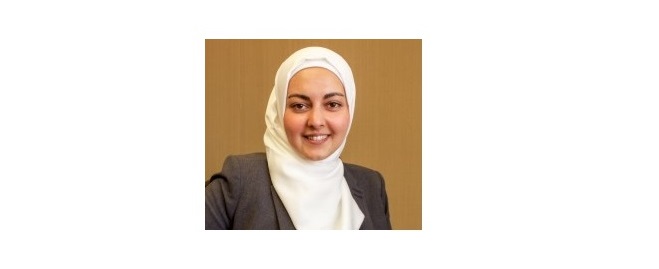This is the sixth installment of our Alumni Spotlight series, which features interviews with former IRAP students who have become strong advocates and leaders in their fields of practice.
Meet Noor Hamadeh, former member of IRAP chapter at The George Washington University Law School and current Law Fellow at the Public International Law & Policy Group (PILPG).
The views expressed here are entirely her own.
How did you become involved with IRAP and how did IRAP impact your law school experience?
I got involved with IRAP my 1L year of law school after hearing about it at the student organization fair in my first week. 1Ls aren’t usually assigned to case teams at GW, but I was asked to assist with a case second semester of 1L year because they needed an Arabic speaker to communicate with the client. This was especially exciting for me at the time because, as a 1L I was becoming frustrated with law school because it was becoming hard to remember why I was there when my classes did not relate to the work I came to law school to do. It was hard to remember why I was there when I wasn’t doing anything that felt meaningful. IRAP was helpful in that it allowed me to do work that impacted lives and also helped me learn more about the legal system around refugees in the US.
IRAP has a unique model of partnering law students with pro bono lawyers — please describe your experience working with attorneys on urgent refugee resettlement cases.
My experience largely depended on the individual attorney we were working with on any given case. Some attorneys were only involved when we had questions or to check on our work and gave us a lot of independence in our work, while others participated in all our meetings and even provided us space in their firms to meet with them. Working with the attorneys was especially useful when we, as students, had little experience with how to respond to difficult or unique situations. I also appreciated that each of the attorneys engaged with us in different ways. This meant I had more independence on some cases, but also more feedback on others.
What have you been doing since you graduated from Berkeley Law in 2016?
I recently began working as a Law Fellow with the Public International Law & Policy Group (PILPG) where I have been working under the Syria Negotiations Support team. I am currently working from PILPG’s Istanbul office, where I have the opportunity to engage with clients more directly than I would in their main office in DC.
In what ways has your involvement with IRAP in law school impacted your career?
IRAP provides many opportunities for the students that participate. It’s a great way to get involved in refugee law without doing an internship with IRAP. IRAP gave me the independence on my cases that an internship does not often provide.
At a time when refugees are more politicized than ever, how do you engage with the issue on a personal level?
The issue of immigrants, and especially refugees, has been a point of contention throughout America’s history. With each new wave of immigrants into our country, there has been discrimination, often justified by national security interests. It’s very easy to see a pattern in the history of our country’s response to immigrants and refugees and it is a shame we have not learned from the lessons of our past treatment of refugees and immigrants. They are treated as national security threats and drains on our economy, even though past experience has shown us that the opposite is true. Instead of draining our economy, refugees contribute to it. Moreover, instead of creating national security problems, refugees have been proud Americans.
It is also shameful that a government with the data to know the facts of the situation chooses to continue to instigate fear and to implement policies that are supported by that fear.




Comments are closed.